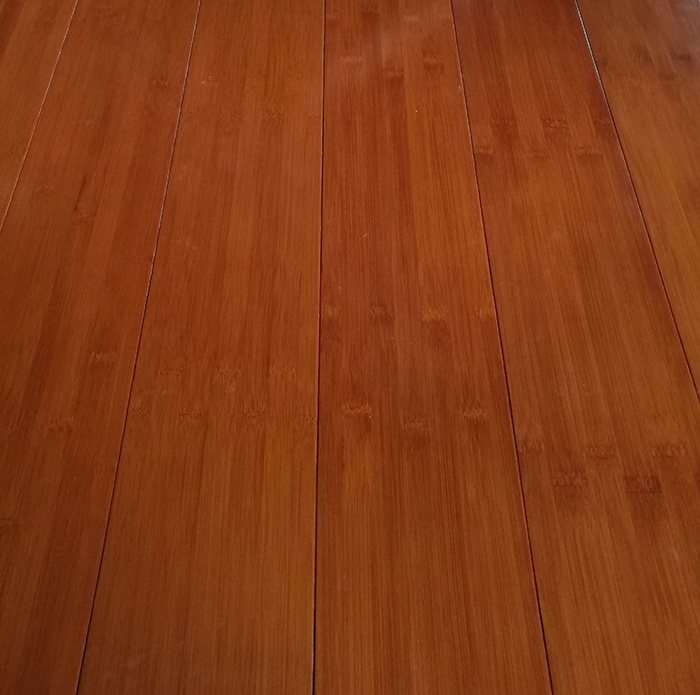Characteristics of Bamboo Parquet Flooring
Bamboo, this large slender plant with fine leaves, is ideal for the manufacture of parquet. Mostly from Asia and South America, its properties are similar to those of exotic woods. Bamboo is extremely hard and resistant. Parquet made from this plant is not sensitive to humidity or temperature variations. It is then declined in terrace boards, as well as solid parquet and engineered parquet flooring.
Concretely, a bamboo parquet can be put in your bathrooms and your kitchens without any problem. It is also compatible with heated and cooling floors. Light or dark in color depending on the finish chosen, it goes with many styles of decorations and can dress all the rooms in your home. Its comfort and strength make this floor a multi-purpose floor covering, which adapts to all your needs and all your desires. It even has the advantage of being easy and quick to clean. It has everything to please!
The 3 aspects of bamboo parquet
The bamboo flooring can be made in three different ways, each giving it a specific appearance. It is the orientation of the fibers of the plant during the manufacture of the floor that changes and create these variations.
The oldest and simplest is the horizontal orientation. This implies that the bamboo stalks are arranged in length on their widest edge. We obtain a natural and authentic parquet, which reveals nodes.
The last method consists of alternating the orientation of the rods before densification by compression. This is densified parquet, which is the hardest and most dense parquet. Its appearance is smooth and flawless.
Why is bamboo parquet flooring eco-friendly?
Bamboo has a lot of qualities, which make it an ecological material par excellence. On the one hand, this plant grows very quickly and therefore allows significant use without risking putting its ecosystem at risk. Indeed, it matures between 3 to 7 years and regrows naturally without the help of fertilizer. On the other hand, its leaves have the particularity of retaining 30% more CO2 than trees, and therefore release 30% more oxygen, which allows the bamboo to have positive eco-balance. This means that even if bamboo is imported, it will not harm the environment.
For a prosecutor's office to be part of an eco-friendly approach, it is obviously necessary to take into account other criteria such as certifications, the products used and the means of transport chosen for the routing etc.
Bamboo flooring has become increasingly popular in recent years, due to its many similarities to classic wood flooring. Bamboo flooring has a chic, exotic, and is still relatively inexpensive, making it a very attractive flooring option for many people.
Understanding the advantages and disadvantages of this type of flooring before installation is essential to ensure that your floor is in line with your lifestyle.
Why bamboo parquet flooring?
In a nutshell, it is a natural surface coating material that is produced from bamboo. For many, it's a great alternative to traditional wood floors. Let's take a closer look at the pros and cons of bamboo flooring, hoping you'll find this information useful.
A bamboo parquet floor can be repaired:
Because bamboo flooring can fade, dent, or scratch over time, it's comforting to know that they can be reconditioned if necessary. Typically, installing bamboo flooring involves many topcoats to protect the bamboo itself. If necessary, simply sand the surface, then reapply a top coat to give a boost to your floor.
Bamboo parquet flooring is subject to scratches:
A poor quality bamboo floor can easily scratch, it is difficult or impossible to keep a completely smooth bamboo floor. Furniture, animals, and even high-heeled shoes can damage the floor's surface over time, even see the sand or tiny particles of everyday life.
A bamboo floor is sensitive to moisture:
Depending on the size of your room, bamboo flooring may deteriorate in very dry or humid environments. If, for example, the bamboo floor is installed in a wet area, the floor may swell. Conversely, in dry regions, bamboo can cause cracks.
Bamboo is a durable product:
High quality bamboo flooring will last as long as traditional wood floors. This is the case in many sectors, quality is a key feature. Non-carbonized bamboo seems to be harder and more durable than red oak.



 皖公网安备 34180202000049号
皖公网安备 34180202000049号